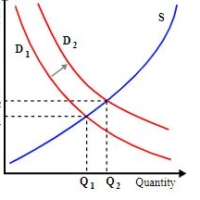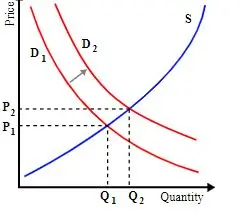When Hungarian Cambridge graduate Dr László Á. Kóczy was approached to take part in a COST Action, he was sceptical. Little did he know, the Computational Social Choice networking initiative he was about to engage in would flower into a research project that would bolster the very foundations of democracy in his country.
Above: A supply and demand diagram
The field of computational social choice may be relatively new, but the issues it addresses are centuries old. With roots going back to the 13th century, social choice theory studies the problems of making joint decisions when the individuals involved in the decision-making process have their own conflicting ideas on how things should pan out. Dr László Á. Kóczy’s work investigates the areas where social choice theory,economics and computer science intersect. It is a complex world of research, inhabited by a variety of protagonists from differing disciplines.
Kóczy is Senior Research Fellow of Game Theory Research Group at the Hungarian Academy of Sciences, Hungary’s most prestigious academic society. He was approached to take part in COST Action Computational Social Choice, but was initially wary of a project he imagined would lead to an administrative headache. He soon realised his fears were overblown. “One must not underestimate the benefits of putting active researchers together for a few days,” he says. “Magic happens.”
In recent years Budapest has become a European powerhouse in the world of Game Theory, the mathematical study of human conflict and cooperation. However for Dr Kóczy, it was a world that was limited by the reach of his academic contacts. The COST network he took part in, chaired by Dr Ulle Endriss of the University of Amsterdam, was a pioneering attempt to bring together researchers from different fields, countries and backgrounds. It employed four groups of researchers to tackle the four main areas of Computational Social Choice theory: Voting, Fair Division, Information Merging and Matching.
“It was a great success,” he says. As a game theorist with a background in mathematics and economics, Dr Kóczy was up to date with literature on the subject, however was surprised to discover a wide degree of scientists were working on the same problems, but with different approaches and goals. “I was very happy getting to know people working beyond my discipline.”
The project lead to the group working on a draft of a change to electoral law. Dr Kóczy, with colleagues Péter Biró and Balázs Sziklai, investigated district apportionment among counties. “The draft of Hungarian law they were inspecting did not explicitly specify how districts should be allocated,” says Dr Kóczy, “but instead described what an acceptable apportionment should be like.” The group concluded that no allocation of districts meet these requirements, and wrote a paper devising a new method to find the closest one. Eventually the law was updated, and a new system was implemented that was “almost identical” to the one they’d proposed in the paper.
“Being part of such a cutting-edge Action allowed me to discuss ideas with many excellent researchers.” says Dr Kóczy. “I can only imagine what such an Action might mean to people with less fortunate backgrounds, it’s almost like becoming a faculty member at a top university.” His time working with COST has left him certain of one thing. In an emerging world of transnational collaboration, the age of research in isolation is over.
*Image Courtesy of Silver Star


